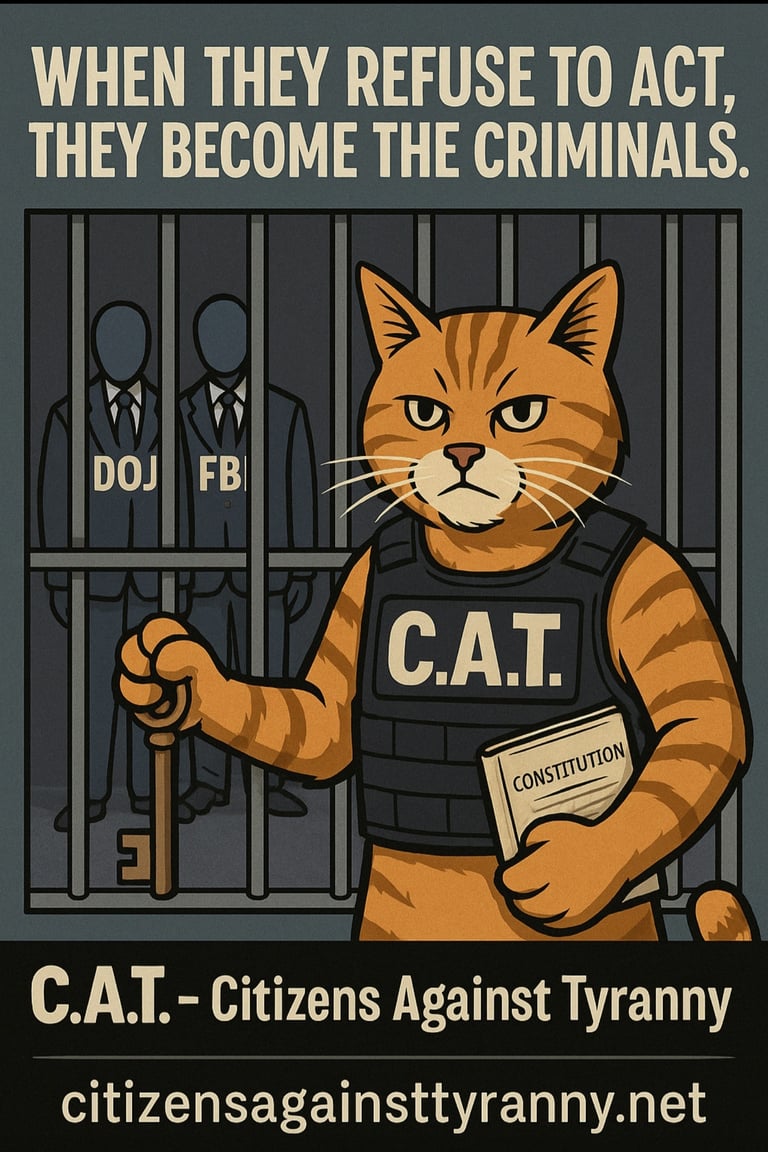TAP MENUE ICON TO VIEW NEXT PAGES
ON MOBILE DEVICES
Public Trust Accountability Act of 2025
Be it enacted by the Senate and House of Representatives of the United States of America in Congress assembled,
SECTION 101. SHORT TITLE.
This Act may be cited as the "Public Trust Accountability Act of 2025."
SECTION 102. PURPOSE.
The purpose of this Act is to restore public confidence in the rule of law by:
1. Eliminating the statute of limitations for crimes of perjury, obstruction, and other abuses of public trust committed by federal officials, employees, or contractors.
2. Establishing criminal penalties for willful refusal of federal prosecutors to pursue such crimes.
3. Empowering citizens to compel independent grand juries where the Department of Justice fails to act.
SECTION 103. CONGRESSIONAL FINDINGS.
Congress finds the following:
(a) The statute of limitations was created to protect citizens, not to shield officials in positions of public trust.
(b) Federal officials, employees, contractors, and judges who commit perjury or obstruct justice commit crimes not just against individuals, but against the American Republic itself.
(c) When the Department of Justice or other prosecutors deliberately refuse to prosecute such crimes, they betray their oath and undermine the Constitution.
(d) Justice delayed is justice denied; justice obstructed by design is treason against the people's trust.
(e) In recent years, the Department of Justice has failed to prosecute known instances of perjury and obstruction by federal officials, deliberately allowing the statute of limitations to expire. Such inaction constitutes a breach of duty and an obstruction of justice. This Act is therefore necessary to ensure that no crime of public trust shall escape accountability through manipulation or neglect of prosecutors sworn to uphold the law.
SECTION 104. DEFINITIONS.
For purposes of this Act:
(a) Crimes of Public Trust include—
1. Perjury (18 U.S.C. §§ 1621, 1623);
2. Obstruction of Justice (18 U.S.C. §§ 1503–1513);
3. False Statements (18 U.S.C. § 1001);
4. Conspiracy Against Rights (18 U.S.C. § 241);
5. Misprision of Felony (18 U.S.C. § 4); and
6. Any other felony committed by—
(A) an elected or appointed federal official;
(B) a federal judge;
(C) a senior federal employee, including directors, deputy directors, inspectors general, and supervisory officials;
(D) a federal prosecutor;
(E) any contractor or entity entrusted with the exercise of governmental authority or the expenditure of federal funds;
in direct connection with their public responsibilities.
SECTION 105. ELIMINATION OF STATUTE OF LIMITATIONS.
Notwithstanding any other provision of law, Crimes of Public Trust shall have no statute of limitations. Such crimes shall remain prosecutable at any time, regardless of the passage of years.
SECTION 106. DUTY OF PROSECUTION.
(a) Any Department of Justice official, United States Attorney, or other federal prosecutor with jurisdiction who willfully refuses or fails to prosecute a Crime of Public Trust, when presented with evidence sufficient to impanel a grand jury, shall be guilty of a felony.
(b) Penalty.—Violation of this section shall be punishable by up to 10 years imprisonment and permanent disbarment from holding public office or practicing law.
SECTION 107. INDEPENDENT CITIZEN GRAND JURIES.
(a) Where the Department of Justice refuses to act within 12 months of receiving evidence of a Crime of Public Trust, a petition of 10,000 registered voters shall compel the formation of an independent federal grand jury.
(b) Authority.—Such grand juries shall have full subpoena power and authority to return indictments, bypassing Department of Justice control.
SECTION 108. SEVERABILITY.
If any provision of this Act is held unconstitutional, the remaining provisions shall remain in full force and effect.
SECTION 109. TOLLING OF STATUTES THROUGH OFFICIAL MISCONDUCT.
(a) Whenever a prosecutor, law enforcement officer, inspector general, or any federal official with investigative or prosecutorial authority willfully refuses, delays, or fails to act upon evidence of a Crime of Public Trust, the statute of limitations for such crime shall be deemed tolled (paused) as of the date such evidence became known to the official.
(b) The tolling shall remain in effect until such time as the matter is properly presented to a grand jury or court of competent jurisdiction.
(c) Any deliberate delay or refusal to prosecute that results in the expiration of a statute of limitations shall itself constitute obstruction of justice under this Act.
SECTION 110. RETROACTIVE APPLICATION.
(a) This Act shall apply retroactively to all Crimes of Public Trust committed on or after January 1, 2015.
(b) Justification. —The American people watched as Hillary Clinton's illegal private server was whitewashed and then watched as the Russiagate hoax was manufactured. In both cases, the Department of Justice slow-walked investigations, obstructed accountability, and shielded insiders until statutes of limitation expired. Such betrayal cannot be allowed to stand. This Act therefore ensures that no crime of public trust committed since January 1, 2015 shall escape accountability through prosecutorial neglect or manipulation.
Prepared by Jonathan Dady
Citizens Against Tyranny

